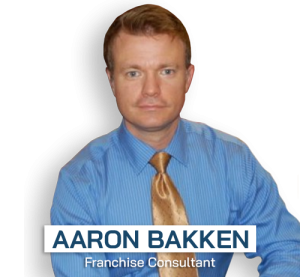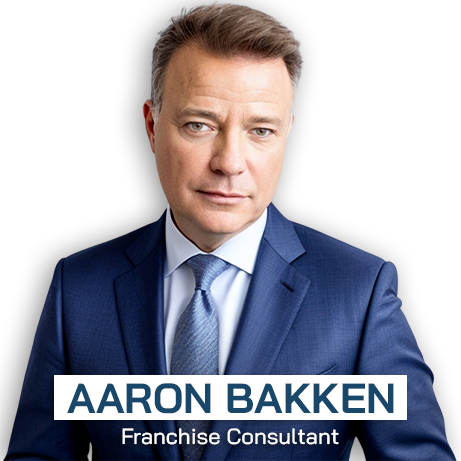 In my years of helping people get into franchise businesses, I’ve learned that it is more important for me to first assess if owning a business is right for my client at all, and if so, if franchising will offer them the opportunities they are looking for. Franchises can easily be misunderstood as businesses-in-a-box or turnkey opportunities. While certainly buying into a franchise program should give you a greater likelihood of success, there’s so much more to it than paying a $50,000 franchise fee and getting a loan. Without the right experience, risk tolerance, willingness to follow their plan and organizational skills, failure is most certainly an option.
In my years of helping people get into franchise businesses, I’ve learned that it is more important for me to first assess if owning a business is right for my client at all, and if so, if franchising will offer them the opportunities they are looking for. Franchises can easily be misunderstood as businesses-in-a-box or turnkey opportunities. While certainly buying into a franchise program should give you a greater likelihood of success, there’s so much more to it than paying a $50,000 franchise fee and getting a loan. Without the right experience, risk tolerance, willingness to follow their plan and organizational skills, failure is most certainly an option.
Becoming a Franchise Owner Is Not a Simple Process
There will be Franchise Disclosure Documents and Franchise Agreements to review, and they are complicated, legal documents. Just as complicated is finding a source of straightforward information on how to choose one of those opportunities, how to evaluate a franchisor’s systems and reputation, and how to differentiate between facts and the promises of creative marketing language. If you truly want to pursue franchising opportunities on your own, you will have to learn as you go.
It can be made less confusing if you have help – that’s where consultants/brokers like me come in (shameless plug). I have personally owned businesses for over 19 years – both independent and franchise. I’ve learned a lot, and made plenty of mistakes, and try to pass on as much of that wisdom as I can. The best part is people like me are compensated by the franchise developers / franchisors, and they don’t charge a premium to you for doing so. As a result, my help & guidance is always free. That being said, we still need to determine if owning a business is right for you, so getting back to it.
I believe any aspiring business owner needs to conduct a self-assessment on their fitness for entrepreneurial-ism before diving in. You need to ask yourself if the demands of business ownership will fit into your lifestyle. As in, are you ready to potentially work 60 – 70 hours/week in the first year to ensure you get off the ground successfully. Trust me when I say that as much as I don’t enjoy working for other people/companies, it is a lot easier. There’s someone to pay your salary, provide & pay for an office, benefits, support, marketing, etc. But they also have all of the control. When you strike out on your own, the world is your oyster. And it can be a heavy one at that, but it’s still “yours” and that’s the best part. Whatever business venture you choose – franchise or something you build from scratch – it needs to fit your goals and lifestyle preferences.
Questions You Need to Ask Yourself Before Getting In Too Far
The following questions apply to either an independent or franchise opportunity. Every answer “yes” goes in the “that’s a good trait for an entrepreneur” box…
- Do you prefer to set your own goals, lead the way and work on your own?
- Do you find the daily requirement to show up at the office, whether you are needed or not, appealing to you?
- Would it make you happier to set your own professional schedule, working when you want to?
- If someone or some company provided you with the training and templates needed to run your own business, and then set you free to go do it, would that excite you?
- Does the idea of building your own team of employees and picking key managers to run an operation sound fun to you?
- If you could run a business from home with no employees, would you?
- Do you like the idea of being a Jack-of-all-trades, the wearer of many hats, the guy/gal that all the good and bad trickles uphill to?
- Do you consider yourself a calculated risk taker?
- Do you feel alive when investing our own money, blood, sweat and tears into something knowing you could lose it all or make an absolute killing if it all goes right?
What Does a Good Franchisee “Look” Like?
First and foremost, becoming a franchisee of someone else’s business program requires you to lose a good portion of your ego. Franchisors seek experienced executives, not because they want people who have a ton of ideas, more so because they have experience running a business or division of a business. They are trained, organized, experienced with managing teams, etc. But when buying into a franchise business, they will make 70% – 80% of the decisions about your business for you. That can be awesome if you’re a corporate refugee that’s been traveling constantly, away from your family, under a lot pressure to perform, all for someone else to reap the majority of the rewards. But for some people that can be stifling, and if that sounds like you then franchising won’t be a good fit. Getting into a franchise business should mean someone has already made a bunch of mistakes, fine-tuned their business processes and in order to make money and avoid more mistakes. Of course, that’s no guarantee you will be successful, but it certainly improves your chances vs. the risks associated with creating something completely from scratch.
Know That The Franchisor Makes The Rules
- These rules help them ensure consistency of service, brand and operations for guests/customers throughout the nation
- Are you a rule follower? Or do you find yourself always trying to find some way to work around them? In your previous positions, if you were able to happily follow corporate
procedures and directives from above, as long as you got to put in occasional input, then franchising could be a good fit. If you were the kid that was always in the principal’s office,
jumping the line, or questioning authority, then better to strike out on your own.
Some People Fit Better With Franchising Than Other
Certain professional backgrounds lend themselves more to franchising than others.
- Chief Operations Officers
- High performers who are used to providing some input but mostly followed the directives of their superiors
- Salespeople who have their egos in check
- Professionals with experience in systems-based structures – fast food management, manufacturing, insurance, finance for example, military veterans
- Marketing executives
In terms of personality types, people who prefer to steer clear of conflict, can handle constructive criticism and prefer someone else providing structure will do well in franchising. That being said, franchisors aren’t looking for drones, more so rule followers who are ready to work hard, follow systems, and ready to work hard.
Ok, so you’re likely seeing a clearer picture for who’s not cut out for franchising, but let’s spell it out any way. Narcissistic people, those who are stubborn or really independent, and the aforementioned
rule breakers. If you are the kind of person who wants to change systems from within, yeah, not a good fit. If you are someone that is deeply technical and has strong ideas for building new technology, there frankly isn’t much franchising has to offer. Many franchisors will avoid financial controllers out of concern they will spend more time analyzing and thinking about “it” than actually just doing “it”. That being said, having a financial background isn’t a bad thing. You simply have to accept that in business you have to spend money to make money.
When you decide to buy into a franchise you won’t be the same kind of entrepreneurs as a selfstarter. Sure, you will own the business and there will be many similarities between you and the independently created business. But a true entrepreneur gets to control the whole process – for better or for worse.
Why You Should Try Just Because You Have The Money
It can be tempting for some franchisors to bring on people that have the finances to get into their system, especially with multi-unit agreements. This can be more tempting for newer franchisors that are not working with an experienced or third-party development team. But just because you have the money to fulfill the investment requirement shouldn’t automatically qualify you. In the early days I worked in franchise development, I worked with a company that gave me a very clear directive: if they can come up with the personal/liquid capital, qualify for a loan to cover the rest, and have a pulse, get them to discovery day. I never agreed with this approach, but then again, I wasn’t calling the shots at that time. Looking back, at least 1/3 of the franchisees I turned over to them didn’t belong, and some have gone out of business and others have been nothing but a constant thorn in the side of the franchisor.
Make Sure It’s the Right Fit
Smart franchisors will turn down candidates that aren’t the right fit. If that ever happens to you, don’t despair. You are still likely a good fit for many other concepts, and they probably did you a favor by keeping you out of a system that would not have been a good fit.
Don’t Get Caught Up In the Hype
You should avoid any franchise that makes claims that you will make money fast, or can double your investment in the first year, or that they guarantee you will be successful. None of this is likely true and could even be unlawful. Yes, there are some franchises that offer a system that can ramp up fast and many that make great money, but this typically takes time. And if they are boasting about it, to me that’s just a red flag that could get them into serious legal trouble. You don’t want to be along for that ride.
Ultimately, what I try to help my franchise clients do is take the time to stop and think about what they really want out of a business investment. There’s a lot of great marketing in franchising and a ton of interesting opportunities. But this is going to be a serious investment for you. It needs to be the right fit for both you and the franchisor. It could involve personal guarantees on loans and leases, not to mention the commitment of your own cash. Spending some of (or all, which I don’t recommend) savings and future security on a franchise should involve a lot more evaluation. Do you have what it takes to see this through?
Contact Arron (608-576-4592) for a Free Consultation!
—
 About Aaron Bakken
About Aaron Bakken
Franchise Consultant for The Franchise Consulting Company
Proven Experience
Aaron has 20+ years of franchise and independent business ownership experience. He also spent 5 years as the VP of Franchise Development for an international franchise group, growing the franchise to the advent of a private equity buyout. Whether you are looking to buy a franchise opportunity or franchise your business, Aaron knows how to guide you.
No Cost To You
Aaron is paid by franchisors and development companies for bringing them viable franchise investors. So frankly, his clients have nothing to lose by engaging with him but a bit of their time. Aaron helps his clients navigate the complex world of franchise ownership and development, and provides long term guidance to help his clients achieve their entrepreneurship goals.
